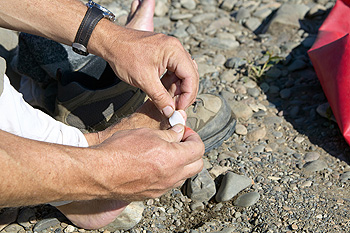Can Blisters Be Prevented While Hiking?
Monday, 28 September 2020 00:00 People who enjoy hiking often experience blisters on their feet. The most common cause of this ailment is excess friction, and this often occurs from wearing shoes and socks that do not fit correctly. Many hikers choose to wear boots, and it is helpful to break them in before beginning a hike. Wear the boots around your home or work with the socks you intend to hike with, and your feet will thank you later. Keeping the feet as dry as possible may also help in preventing blisters from developing. It is beneficial to pack extra socks, which can be swapped out immediately if the first pair becomes moist or wet. Please confer with a podiatrist if you would like additional tips on how to prevent blisters on the feet.
People who enjoy hiking often experience blisters on their feet. The most common cause of this ailment is excess friction, and this often occurs from wearing shoes and socks that do not fit correctly. Many hikers choose to wear boots, and it is helpful to break them in before beginning a hike. Wear the boots around your home or work with the socks you intend to hike with, and your feet will thank you later. Keeping the feet as dry as possible may also help in preventing blisters from developing. It is beneficial to pack extra socks, which can be swapped out immediately if the first pair becomes moist or wet. Please confer with a podiatrist if you would like additional tips on how to prevent blisters on the feet.
Blisters are prone to making everyday activities extremely uncomfortable. If your feet are hurting, contact one of our podiatrists of Central Ohio Comprehensive Foot Care. Our doctors can provide the care you need to keep you pain-free and on your feet.
Foot Blisters
Foot blisters develop as a result of constantly wearing tight or ill-fitting footwear. This happens due to the constant rubbing from the shoe, which can often lead to pain.
What Are Foot Blisters?
A foot blister is a small fluid-filled pocket that forms on the upper-most layer of the skin. Blisters are filled with clear fluid and can lead to blood drainage or pus if the area becomes infected.
How Do Blisters Form?
Blisters on the feet are often the result of constant friction of skin and material, usually by shoe rubbing. Walking in sandals, boots, or shoes that don’t fit properly for long periods of time can result in a blister. Having consistent foot moisture and humidity can easily lead to blister formation.
Prevention & Treatment
It is important to properly care for the affected area in order to prevent infection and ease the pain. Do not lance the blister and use a Band-Aid to provide pain relief. Also, be sure to keep your feet dry and wear proper fitting shoes. If you see blood or pus in a blister, seek assistance from a podiatrist.
If you have any questions, please feel free to contact one of our offices located in Delaware and Westerville, OH . We offer the newest diagnostic and treatment technologies for all your foot care needs.








